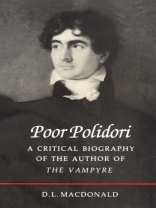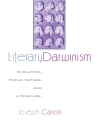In 1816, John William Polidori travelled to Geneva as Byron”s doctor. There he took part in the famous ghost-story project that inspired Frankenstein. As the medical member of the party, he contributed some scientific information to Mary shelley”s novel. As a writer, he was the most industrious of the party, producing both a novel of his own, Ernestus Berchtold, and The Vampyre, a tale based on an idea of Byron”s. An unscrupulous publisher issued Polidori”s tale under Byron”s name, thereby ensuring great success for the book, although not for its true author. (Byron fired Polidori as his doctor soon after.) History has not paid Polidori much attention. Although he has figured prominetly in a few novels and films, there has never been a full-length study of his life until now.
D.L. Macdonald rectifies the situation with this biography. He explains how Polidori”s vampire was created as a caricature of the doctor”s employer – the aristocrat, the traveller, the seducer. This version differed entirely from the vampire of folklore. It became extraordinarily influential, and remains essentially the vampire of popular culture today.
Polidori”s life, through short and unsuccessful, provides an opportunity for a new look at the Romantic period. His very lack of success forced him to engage himself succesfully in medicine, literature, law, politics, philosophy, and religion. In following his course we encounter not only a fascinating character but also a wide cross-section of cultural history.












